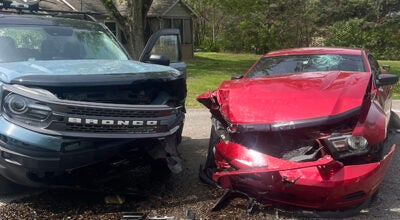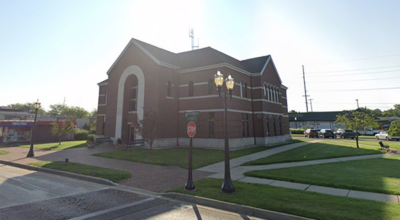Long standing Dowagiac church celebrates centennial anniversary
Published 8:00 am Tuesday, June 9, 2015

Steve Arseneau, director of the Dowagiac Area History Museum, shared the history of Dowagiac’s oldest public structure to the audience gathered inside St. Paul’s Episcopal Church Friday afternoon. The church celebrated its centennial birthday as member of the Diocese of Western Michigan that weekend. (Leader photo/TED YOAKUM)
As can be expected for a structure erected nearly 150 years ago, the chapel of St. Paul’s Episcopal Church is closely tied with the history of Dowagiac.
Built under the leadership of Dowagiac pioneer Justus Gage, purchased and maintained by powerhouse industrialist P. D. Beckwith, and now the place of worship for generations of the Judd family, the list of names associated with the Courtland Street church reads like a “who’s who” of the movers and shakers who have shaped the Grand Old City into the community it is today.
Members of St. Paul’s celebrated their church’s place in Dowagiac history during a special presentation inside the chapel Friday evening, in celebration of their 100th anniversary as a member of the Episcopal church. Invited to speak during the ceremony was local historian Steve Arseneau, the director of the Dowagiac Area History Museum, who recounted the history of the century-and-a-half-old building and its context in the greater tale of Dowagiac.
The church was constructed by Gage in 1859, making it the oldest public structure in Dowagiac.
The structure originally served as Universalist church, and would serve as the church for a number of influential Dowagiac residents, including Philo Beckwith, the founder of the Round Oak Stove Company, and James Heddon, founder of Heddon Company, Arseneau said.
“These two men, who would employ many Dowagiac residents, were heavily influenced by this church’s Universalist congregation,” Arseneau said.
After Gage’s death in 1875, the church’s membership slowly dwindled, and eventually leaders closed its doors in 1884. Shortly thereafter, Beckwith purchased the building for $600, and decided to let other congregations use the space for worship, free of charge, Arseneau said.
The church also served as a central meeting place for community residents, the director said.
“Dowagiac did not have any sort of auditorium, theater or venue for speakers,” Arseneau said. “This building filled that void.”
A liberal community during the mid-1800s, Dowagiac would host speakers like women’s rights advocates Victoria Woodhall, Susan B. Anthony and civil rights supporter Sojourner Truth. The church also served as a community memorial following the assassination of President Abraham Lincoln in 1865.
In 1911, a group of Episcopalians signed a five-year lease with the Universalists still occupying the church, paying them $100 a year to use the building for their own worship services. Two years later, the members purchased outright, and on June 8, 1915, St. Paul’s was officially established as a parish of the Diocese of Western Michigan.
The church has served as an Episcopal Church ever since, undergoing several remodels and even surviving a fire in 1958. In that same time period, Dowagiac has seen its downtown fall and rise again, a community college spring up and prosper, and a fine arts festival become an annual spring time festivity, Arseneau said.
“St. Paul’s endured throughout,” he said. “Congratulations to St. Paul’s Episcopal Church for 100 years; I wish you another 100 more.






